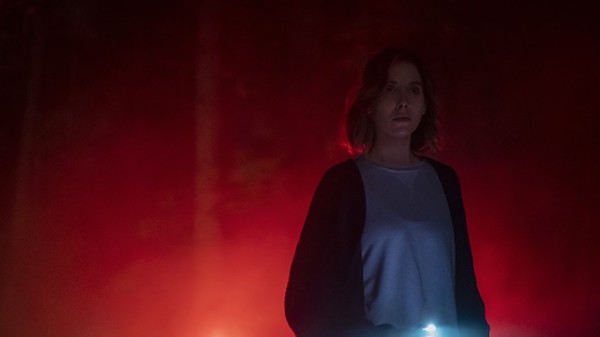Film Review: “The Rental” — Low Rent B and B Horror
By Isaac Feldberg
The Rental chugs along predictable genre rails, its characters settling into the expected “types” as screws are gradually turned on them by whoever’s surveilling from a distance.

A scene from The Rental — mind games for the mumblecore set?
The best that can be said for a directorial debut as amateurish and perfunctory as The Rental (now available on VOD), before it reneges on its tacit agreement to inflict Haneke-style mind games on the mumblecore set (not an inherently unappealing proposition, as anyone who sat through Hannah Takes the Stairs will tell you), is that a few strong performances, including from its writer-director Dave Franco, show signs of life within its closed world of drearily self-obsessed hipsters and miasmic foreboding.
Best of all is Dan Stevens, the Downton Abbey actor who since departing the buttoned-up period drama has weaponized his easy charm and unflappably calm demeanor to play a series of psychopaths (The Guest), certified head-cases (Legion), and haunted outcasts (Apostle). As Charlie – a tech entrepreneur who whisks his wife Michelle (Alison Brie, TV’s Glow) away for a vacation weekend with his business partner/best friend Mina (Sheila Vand, A Girl Walks Home Alone At Night) and her boyfriend Josh (Jeremy Allen White, late of TV’s Shameless, twitchy and particularly impressive), also Charlie’s brother – Stevens is operating at a low, menacing hum throughout. He’s a Silicon Valley bro in the classic mold, a smug shark all the more dangerous for having convinced himself he’s actually a nice guy, and Stevens captures the narrowed, impatient hunger behind his eyes.
When Charlie, Michelle, Mina, and Josh first arrive at a striking vacation home that looks out over the Oregon coastline, they’re greeted by a Harbinger-styled caretaker (Toby Huss, creepy in an effectively low-key way) who accepted Charlie’s Airbnb rental request but turned down Mina’s; she’s of Middle Eastern descent and, as the only nonwhite member of the party, she is (of course) the first to suspect the caretaker of underhanded behavior. Quickly irate, she confronts him with some condescension of her own, doubting his country accent and working-class attire, questioning if he even owns the rental in the first place. There’s an intriguing thread here The Rental tugs on only slightly, involving the ominous nature of microaggressions: how they can very often clue us in to bad actors, or at least to those harboring an inner darkness — if we have the awareness to notice them.
But in a horror-thriller such as this, some early cluelessness is to be expected, and these four soon brush off the encounter in order to properly savor their weekend, complete with drinks, drugs, and hot-tub jets. But trouble in paradise comes in the form of wandering eyes; Charlie and Mina share an easy intimacy that typically bolsters their professional relationship, but it blurs boundaries once Ecstasy’s introduced and their respective partners pass out for the evening. Cracks appear elsewhere, too. Josh, who’s endearingly oafish, fears correctly that Mina’s too smart for him, while Michelle’s both jealous of her husband’s bond with Mina and increasingly alarmed to learn more about his philandering in past relationships.
Lines are crossed, hangovers nursed, regrets registered; the next morning, Mina uncovers what appears to be a hidden camera in the shower. Typically, such a “peeping tom” intrusion would be cause for a police call and a one-star rating. But, seeing that said shower played host to some of the most egregious aforementioned line-crossing, Mina and Charlie must instead figure out how to deal with this violation without acknowledging their own indiscretion.
None of this is particularly intriguing or remotely innovative, it must be said. Behind the camera, actor-turned-director Franco (Nerve) works to establish an appropriately chilly, dark color palette, though he and cinematographer Christian Sprenger (TV’s GLOW) lean too far in this direction during a murky, tough-to-follow third act. The director seems at first to be after slow-building suspense in the vein of Hitchcock, channeling the sadistic voyeurism of masterworks like Vertigo and Psycho, despite completely eschewing those films’ fetishistic lenses. Consequently, the homage ends up skin-deep, bloodless, really just a formal exercise in search of a dramatic purpose. There’s a strong sequence late in the game where our perspective is shifted to demonstrate the degree to which the film’s characters are under surveillance. Intended to heighten the pervading sense of paranoia, it arrives suddenly and suggests a far more interesting take on this material than the one that both precedes it and quickly resumes.

Really? Taking a shower at The Rental.
The Rental instead chugs along predictable genre rails, its characters settling into the expected “types” as screws are gradually turned on them by whoever’s surveilling from a distance. There is little filmic support for its modern “Scare-bnb” premise by way of claustrophobic tech-constructs (like the far scarier, nastier, more ambitious Unfriended: Dark Web) or even a clever third-act twist. The script, which Franco co-wrote with Joe Swanberg (Win It All; Drinking Buddies), is rather unforgivably slack despite clocking in at 88 minutes, especially as any twists of import are saved for a third act that flips the film from low-wattage drama to sub-’80s slasher.
Depending on who you ask, Swanberg is either acclaimed for or guilty of popularizing the so-called “mumblecore” subgenre of indie cinema, one lined by gentrified Brooklyn 30-somethings, shoestring budgets, and often hollow apings of Cassavetes-style naturalism. His presence is felt most strongly in The Rental’s milquetoast sexual confusion and millennial-cusp messiness; the characters in its central foursome are thinly sketched individually, but they collide and connect in marginally more intriguing ways. Franco and Swanberg make an effort to pair them off in different combinations throughout the film. (As Michelle and Josh, the two loving partners to Charlie and Mina’s restlessly jerkish entrepreneurs, Brie and Allen White get less to do and ultimately do more with it, especially when their characters are asked to turn on a dime in response to events their lovers set in terrible motion. It’s to the film’s detriment that two actors so attuned to nuance are near-systematically deprived of opportunities to exercise it throughout.)
Swanberg’s dabbled in horror before with the V/H/S segment “The Sick Thing That Happened to Emily When She Was Younger” (which more effectively pierced the illusion of privacy proffered by modern tech). But, as there, here his weaknesses as a writer are unflatteringly exposed: mansplain-y male characters, passively underwritten female characters, and a grating tedium to how both types interface. But there’s no telling whether the blame for The Rental’s cardinal sin – its insulting nonstarter of an ending – lies more with its mumblecore-pioneer co-writer or its neophyte writer-director. Without veering too far into spoiler territory, The Rental shape-shifts from relationship drama to paranoid thriller to something much more brutal (and, paradoxically, pat). But it ends up wheezing in the effort of doing so; almost all of Franco’s carefully built tension evaporates once the hammers come out and a vicious third party enters the picture. The horror elements of The Rental are uncompromising, violent, and abrupt; in spurts, that can work, but Franco swings his jump-scares so much like an executioner’s ax that there’s scarcely a story left once they land.
Where The Rental fully loses me is in its appending final scenes, wherein a sequel is teased and a broader meaning isn’t suggested so much as shoved brusquely into view. There’s a callousness to the film’s conclusion that is more careless than nihilistic, a failure of imagination dressed up as a capital-P point. It underscores the sense of overriding indifference you’ll feel watching this film. The Rental demonstrates a certain amount of technical skill on Franco’s part. His more understated approach to suspense shows some promise, even the earliest suggestion of a voice. What he doesn’t have, at least at this stage, is something to say.
Isaac Feldberg is an entertainment journalist currently based in Boston. Though often preoccupied by his on-going quest to prove that Baby Driver is a Drive prequel, he always finds time to appreciate the finer things in life, like Michael Shannon.
